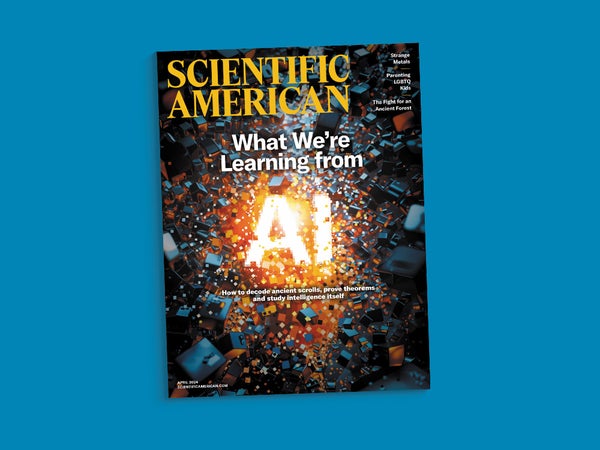New Insights from AI, Strange Metals and Parents of LGBTQ Kids
AI has deciphered ancient texts, learned new math and provided new ideas about human consciousness

Scientific American, April 2024
Artificial intelligence is finally starting to live up to the second half of its name. You’ve probably heard a lot of buzz about large language models lately—the text-producing AIs that can spit out fluent essays based on the books and articles and other data they’ve been trained on. They may sound smart, but on closer inspection, they are full of biases and make things up (you may know someone who does something similar). In this issue, we present some of the more interesting new insights from AI research.
The eruption of Mount Vesuvius in C.E. 79 destroyed the Roman towns of Pompeii and Herculaneum, but it didn’t quite destroy a library full of scrolls, which was found in 1709. Scholars tried to unroll and read the charred papyrus, only to destroy the scrolls in the process. Writer Tomas Weber reports on a contest to use AI to decipher the ancient Greek text. The artifacts posed problems that only machine learning could solve. Now researchers have used AI to rediscover a long-lost philosophical passage about pleasure.
The quest to make AI even more intelligent is advancing our understanding of human intelligence, as author and Scientific American contributing editor George Musser tells us. According to one theory, consciousness is what makes sense of inputs and analyses from various brain regions, a kind of workspace for solving problems. As AI advances, it is using and testing theories about how the different parts of the mind collaborate.
On supporting science journalism
If you’re enjoying this article, consider supporting our award-winning journalism by subscribing. By purchasing a subscription you are helping to ensure the future of impactful stories about the discoveries and ideas shaping our world today.
AIs are now capable of solving geometry problems at the level of gold-medal Olympiad contestants, as physicist and writer Manon Bischoff explains. And large language models trained on religious texts are helping scholars translate and comprehend such works—but as science journalist Webb Wright discusses, some theologians are worried about the implications. No word yet on whether an AI will create nine billion words for “god,” as happens in an Arthur C. Clarke short story, and end the universe.
The best parents learn from their children—learn to be stronger for their sake and more compassionate, learn to appreciate the world in new ways. I’m inspired by parents who overcome their own expectations when they find out their child is gay or transgender or otherwise doesn’t fit in traditional roles. As more anti-LGBTQ laws are introduced and passed in the U.S., many of these parents are fighting for their children’s rights, education and basic health care. Author Marla Broadfoot shares how parents are learning to support their kids and one another.
As physicist Douglas Natelson points out, human technology has advanced through the use of metals since the Bronze Age. Yet we still don’t fully grasp their properties. In a new class of metals called strange metals, electrons behave as swarms rather than individual particles. Natelson describes how scientists are poking and prodding these metals in creative ways, hoping to understand not just these materials but all metals and even get insights into physical interactions at the event horizons around black holes. Diagrams from Scientific American senior graphics editor Jen Christiansen are interspersed throughout the text of the story to help you visualize and enjoy this research.
One of the few remaining old-growth forests in the continental U.S. has existed for thousands of years, and we hope it will exist a thousand more. The Yaak, in northwestern Montana and upper Idaho, spreading into Canada, is a rich rainforest, and parts of it have never been logged. A Trump-era proposal to allow logging in the Yaak has been blocked in court for now but not abandoned. Writer Alexis Marie Adams takes us on a tour of the sights and sounds of this rare and majestic forest.

